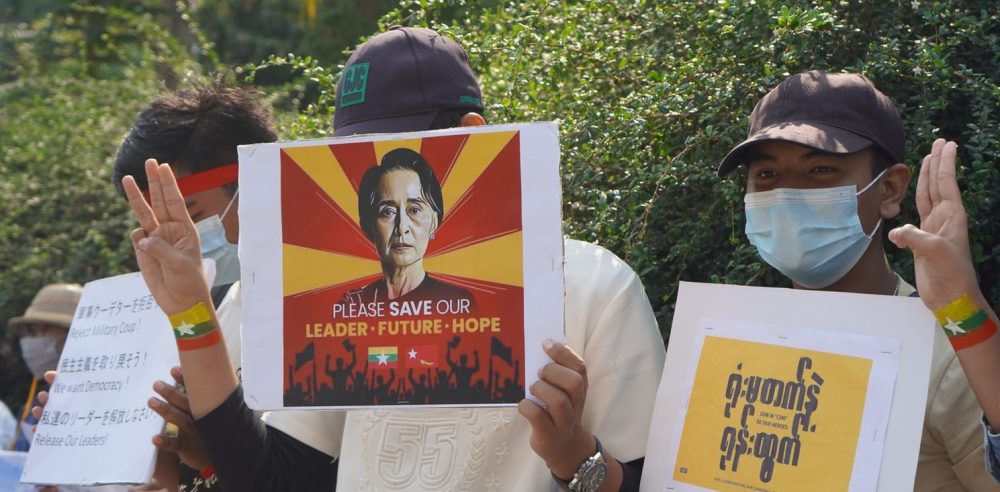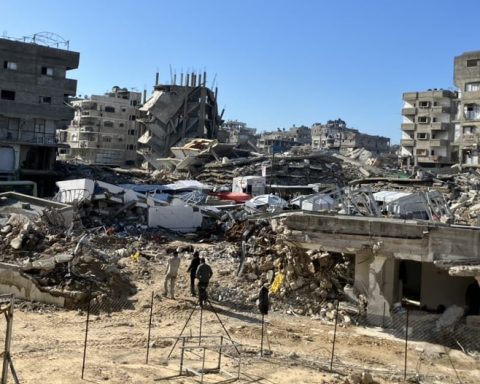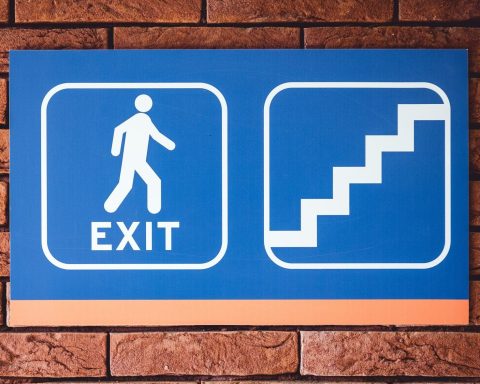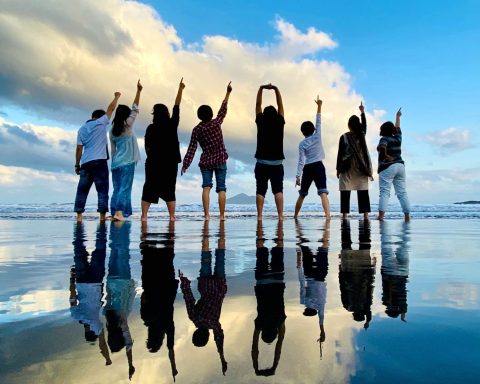 Anonymous*
Anonymous*
Dr Htar Htar Lin, the Director of Myanmar Immunisation Program who led Myanmar’s COVID Vaccination Campaign, has been found to be positive for COVID infection whilst in prison.
Dr Lin is well-known for her dedication, enthusiasm and her great effort in leading the COVID Vaccination program in Myanmar. She was one of the members of country’s delegation to India who were successfully able to obtain Covishield (Covid Vaccine) for Myanmar as early as possible.
She and her team worked very hard round the clock in preparation to deliver the COVID vaccination program as soon as the vaccines arrived in Myanmar. Their great effort helped the successful delivery of the country’s Covid vaccination programme in January 2021 as one of the earliest countries in the region.
Since the Military coup on 1st February the country has been in turmoil.
Unfortunately, she was arrested by the Military State Administration Council (SAC) on 10th June 2021 and is being detained, having been accused under penal code “505-A“. One month on it has been heard that Dr Lin is currently being held in Naypyitaw Guard where she tested positive for COVID infection a few days ago.
The details of her condition, what support has been provided to her, whether she will receive proper medical care and when she will be moved to a medical facility to receive necessary treatment are all unknown.
It is our contention that it is everyone’s rights to get medical care when needed. The military SAC are under an obligation to transfer her to a proper medical care facility or hospital, rather than keeping her in the prison without medical facilities or care.
In the midst of the 3rd wave of COVID in Myanmar many health care providers …. have been arrested by the military.
Dr Lin, as well as other well-known doctors such as Professor Maw Maw Oo (Head of Emergency Medicine Department, Yangon General Hospital), Dr Than Min Htut (Medical Superintendent of Pathein General Hospital) and all the other healthcare professionals detained by the military should be released without delay, especially during the Covid pandemic 3rd wave.
Prof Maw Maw Oo is also believed to be suffering with COVID infection and currently being treated at the North Okkalapa General Hospital.
One experienced doctor has stated that “SAC must release all the health care professionals at once, exceptionally, during this COVID third wave. All warrants for doctors and nurses must also be erased as they are the noble professionals at the time of pandemic. Health professionals must be treated well for COVID infection because they sacrificed for the country for many years and also during COVID first and second waves. They should be in their right place, not in prisons or not hiding away from home”.
*The author, who is from Myanmar, wishes to remain anonymous for security reasons. This article has been passed to BJGP via trusted sources.
This article has been published to highlight the health and human rights issues that are affecting our colleagues in Myanmar. Please see our other articles on these issues:
-
MYANMAR DOCTORS UNDER A MILITARY COUP IN THE MIDST OF THE PANDEMIC
-
THE DREAM OF UNIVERSAL HEALTHCARE IN MYANMAR BECOMES A NIGHTMARE







Jim Brockbank has retired from general practice. He continues in his role as a GP Appraiser and as an International RCGP Trainer for Myanmar.
Athird wave of COVID-19 is raging across Myanmar, the sick are being left to die in the streets or at home, smoke pours from crematorium chimneys, makeshift morgues are overflowing, two dead are put in one casket such is the shortage of coffins. Given the military’s crackdown on information it is difficult to obtain true figures on COVID-19 cases and deaths, but the evidence is in the streets.
It’s hard to understand the actions of a leadership that attacks doctors and nurses at the peak of a pandemic, but that is what is happening in Myanmar. Medics fear arrest or detention at a time when Myanmar needs them most.
The arrest of Dr Htar Htar Lin, the former head of the vaccination programme in Myanmar, has been previously discussed in this journal.2 In a breathtaking example of conceit and entrapment three doctors were arrested in July after they arrived at an apartment in Yangon to attend a severely breathless man, he proved to be a police officer feigning illness.3 The doctors were from a group who advise virus sufferers over the telephone how to breathe, how to use an oxygen concentrator, and which medicines to buy and how to administer them. Witnesses saw the doctors, handcuffed and bruised, being led away. Their covert clinic was raided, oxygen cylinders and PPE were seized. In addition to seizing oxygen cylinders it is reported that the Junta are blocking factories from re-filling people’s oxygen cylinders.3
In Yangon the security forces opened fire on civilians queuing in line for oxygen, and in Mandalay the military killed one civilian searching for oxygen. There have been reported incidents of patents with COVID-19 being refused admission to hospital.3 In August the number of people killed due to political violence surpassed 1000. Thousands more have been injured, and more than 3300 people remain in detention, including healthcare workers.4
The Junta has centralised all resources for providing medical aid including vaccines, oxygen, and medication. Testing for COVID-19 has plummeted and the vaccination programme has stalled, available data show that only about 6% of the population of 54 million have been fully vaccinated.5
The severe shortage of oxygen, medical equipment, and medication in cities across Myanmar has resulted in people hanging yellow and white flags outside their homes to signal that they need food or medicine, social media has been flooded with pleas for help.6
COVID-19 meets a weak and overwhelmed healthcare system
The crackdown on health care is hitting an already vulnerable system at a critical time. Before the coup Myanmar had 6.7 physicians per 10 000 people in 2018, significantly lower than the global average of 15.6.7 Despite limited resources the Myanmar healthcare system managed to cope with the virus last year, but the coup changed all that.
The National League for Democracy (NLD) recognised the need to improve the healthcare system, which resulted in The New National Health Plan for Myanmar 2017–21 being launched in March 2017 by Aung San Suu Kyi. This is where my own connection and commitment to Myanmar began, which has been previously discussed in this journal.8
In addition to coping with COVID-19 the healthcare system is struggling to provide general health care, and UNICEF has reported that about 600 000 newborn are not receiving essential care, a million children are missing out on routine immunisations, and more than 40 000 children are no longer getting treated for malnutrition.7 Pregnant women and other vulnerable groups face new obstacles in reaching essential care and basic services. Necessary acute, chronic, and preventive care for their communities is an immense challenge for healthcare providers.
Access to health care is particularly challenging in the rural areas and for the population of internally displaced people in the border regions. Over the last 3 months, around 2500 people have arrived in one locality where a group of doctors and nurses have set up medical facilities.
They additionally provided a quarantine centre where new arrivals could be isolated according to World Health Organization guidelines. Over a 4-week period they identified 60 COVID-19 cases and successfully managed three moderate-to-severe cases with oxygen saturation levels <93% in the makeshift COVID-19 inpatient centre. Healthcare staff can get further support and advice on social media from the Ministry of Health in the opposition National Unity Government (NUG), which is run by medics who are part of The Civil Disobedience Movement. COVID-19 test kits, PPE, and medical equipment is provided through donations.
COVID-19 cases are on the increase, there is delay in obtaining medical equipment and medication because of transport problems to these regions, let alone the thievery of the Junta, and a major constraint is that severe COVID-19 cases can’t be transferred to hospital because of lack of staff and people who are frightened to attend.
The call for civil disobedience has been stepped up
The dilemma of civil disobedience at a time of COVID-19 was discussed in this journal recently.9 The launch of a people’s defensive revolution by the president of the NUG on 7 September calling for the people of Myanmar to revolt against the Junta could escalate the conflict to a point where the healthcare system itself is dead and buried.10 A military coup coupled with a stricken healthcare system and a pandemic has already killed thousands, Myanmar could be left with no room to breathe.
The monitoring of how to continue to deliver support for healthcare workers in their commitment to deliver urgent, routine, and COVID-19-related health care to their communities will need to be doubled down. Solutions will need to be found regarding access to health care and to medical training.
Getting down to the facts
In a recent survey of 25 000 people who suffered from COVID-19, the NUG Ministry of Health compared data announced by the State Administration Council (SAC), representing the Junta.11 The death rate was 15% regardless of the place of death, five times higher than the 3.2% reported by SAC, which counted only hospital deaths. Thirty-four per cent of patients with suspected COVID-19 sought care online and 21% from home care services; only 5% received hospital care from government hospitals. Of all the responders, 25% received oxygen treatment. Most of the patients who were critically ill did not receive the necessary hospital care; 73% of deaths occurred at home, 17% of deaths occurred in government hospitals.
Frontline care in a ‘perfect storm’
Imagine trying to provide health care in these circumstances, not surprisingly doctors and nurses are overwhelmed. The reality is that the majority of patients with COVID-19, including people with severe disease, are staying home; they are either self-treating, or relying on care from local doctors and nurses operating in secret. Ducking and diving under cover, medication in short supply, and 73% of COVID-19 deaths occurring in the home — these are extraordinary challenges.
Cultural factors shape health-related beliefs and behaviours. There is a wrong assumption that available medicines for COVID-19 should be given to patients as early as possible, and the concept of ‘right patient at the right time with the right dose’ is stressed. Antivirals and antibody products can be very expensive, and ethical prescribing with clear discussion of benefits is encouraged. Clinicians need to be prepared for managing deterioration and death alongside the acute medical management plan. Severely ill patients need an explanation that hope that their treatment will help needs to be balanced with the fact that they are sick enough to die.
The concept of palliative care is new to doctors and nurses in Myanmar, and it is a step change to accept that palliative care is not ‘giving up’ but is active management for patients not responsive to curative treatment with the goal of achieving the best quality of life. This is a real challenge in the context of shortage of even basic medication including analgesics, anxiolytics, and corticosteroids.
Most nurses, who previously worked in the hierarchical system of government hospitals, have refused to return to work since the coup and many nurses now provide community level health care outside of hospitals in ‘pop-up’ clinics. Many nurses and student nurses find themselves the only healthcare provider in their village, a role for which they were never trained. They work with a lack of supplies and live under the constant fear of arrest, recently two nurses purchasing supplies of medication were arrested (Anonymous, personal communication, 2021).
On the government-run TV stations live arrest warrants are announced for nurses, and those who have been arrested have been paraded ‘confessing’ on prime-time evening television. Yet they continue, supporting their communities and their patients.
Continuing to deliver support for healthcare professionals
In all this doctors and nurses need help, and the UK health community response to the call for educational support from Myanmar colleagues has resulted in an impressive array of initiatives previously discussed in this journal.12
Regular webinars on COVID-19 for GPs are now taking place. Teaching topics include:
drug therapies in the management of COVID-19;
vaccines;
thromboprophylaxis in COVID-19;
impact of COVID-19 on non-communicable diseases (NCDs);
long COVID;
palliative care — end-of-life care, specific to COVID-19; and
roleplay in Burmese.
Recent funding has been approved for ‘strengthening the Myanmar GP service provision during the COVID-19 pandemic’ by the Foreign, Commonwealth and Development Office (FCDO). This will include small group education webinars, strategies to build personal resilience, and practical support for PPE, oxygen, and medication.
Myanmarclinicalguidance.com is a website established by the Royal College of Paediatrics and Child Health (RCPCH), it does not collect any user identifiable data and is low bandwidth for easy access. The site contains clinical guidelines and medical resources selected by experts for use by doctors, nurses, and others in Myanmar, and includes a course titled ‘COVID-19 primary care response in low resource settings’ with the following topics:
cover a guide to public health measures;
triage and management in primary care;
planning for healthcare delivery during the pandemic;
prevent the spread of COVID-19;
NCDs and COVID-19; and
mental health for the community during COVID-19.
The site also links to an increasing number of social-media-friendly videos, with Burmese narration and subtitles that give Burmese clinicians guidance on medical procedures and the general public advice on first aid.
The global health picture
‘Vaccines must be tools of protection, not politics’13
If the coup itself did not prompt concerted international efforts to resolve the humanitarian crisis, the public health implications certainly should. Myanmar borders India, China, and Thailand, and Myanmar is at risk of becoming a COVID-19 super-spreader. The United Nations (UN) special rapporteur for Myanmar has urged the security council to call for a ceasefire. It is reported that a ceasefire has been declared by the Junta for humanitarian aid, but nobody trusts them.
It is hoped that the UN Secretary General will seize the initiative and travel to Myanmar to negotiate a sustained halt to the conflict to allow a third party vaccination programme to be undertaken, in which humanitarian workers will be neither obstructed nor targeted. Engagement of the people of Myanmar will be a challenge in itself and public trust in COVID-19 vaccines and vaccination will be as essential as the effectiveness of the vaccines themselves. Let’s hope the military will accept international assistance to contain the coronavirus.
References
1. Amnesty International. Myanmar: military threatening health workers amid COVID-19 surge. 2021. https://www.amnesty.org.uk/press-releases/myanmar-military-threatening-health-workers-amid-covid-19-surge/ (accessed 16 Sep 2021).
2. Anonymous. Myanmar’s Director For Covid Vaccination Programme tests positive whilst in prison. 2021. https://bjgplife.com/2021/07/20/myanmars-director-for-covid-vaccination-programme-tests-positive-for-covid-whilst-in-prison (accessed 16 Sep 2021).
3. Insecurity Insight. Violence against or obstruction of health care in Myanmar. 2021. http://insecurityinsight.org/wp-content/uploads/2021/08/Violence-Against-Health-Care-in-Myanmar-February-July-2021-August-update.pdf (accessed 16 Sep 2021).
4. United Nations. Daily press briefing by the office of the spokesperson for the Secretary-General. 2021. https://www.un.org/press/en/2021/db210823.doc.htm (accessed 16 Sep 2021).
5. Our World in Data. Coronavirus (COVID-19) vaccinations. Myanmar: share of people vaccinated against COVID-19, Sep 11, 2021. 2021. https://ourworldindata.org/covid-vaccinations (accessed 16 Sep 2021).
6. Ratcliffe R. Myanmar could become Covid ‘super-spreader’ state, says UN expert. The Guardian 2021; 28 Jul: https://www.theguardian.com/world/2021/jul/28/myanmar-could-become-covid-super-spreader-state-says-un-expert (accessed 16 Sep 2021).
7. Gelineau K, Milko V. In Myanmar, the military and police declare war on medics. 2021. https://apnews.com/article/only-on-ap-myanmar-business-science-coronavirus-pandemic-3b4c3e6d711b5eac1209a2c8fd90b2b4 (accessed 16 Sep 2021).
8. Brockbank J. The dream of universal healthcare in Myanmar becomes a nightmare. 2021. https://bjgplife.com/2021/03/29/the-dream-of-universal-healthcare-in-myanmar-becomes-a-nightmare (accessed 16 Sep 2021).
9. Aung HM. The dilemma of civil disobedience at a time of COVID. 2021. https://bjgplife.com/2021/09/03/the-dilemma-of-civil-disobedience-at-a-time-of-covid-19 (accessed 16 Sep 2021).
10. Davies E. Myanmar shadow government calls for revolt against military rule. 2021. https://www.reuters.com/world/asia-pacific/myanmar-shadow-government-unveils-new-strategy-oppose-military-rule-2021-09-07 (accessed 16 Sep 2021).
11. Ministry of Health, National Unity Government. Assessment on COVID-19 during third wave by MOH, NUG. 2021. https://moh.nugmyanmar.org/assessment-covid-third-wave (accessed 16 Sep 2021).
12. Brockbank J. Project Empathy. A response to the healthcare crisis in Myanmar. 2021. https://bjgplife.com/2021/05/28/project-empathy-a-response-to-the-healthcare-crisis-in-myanmar (accessed 16 Sep 2021).
13. @UKUN_NewYork. #Myanmar: vaccines must be tools of protection, not politics. 2021. https://www.twitter.com/ukun_newyork/status/1427674683445481477 (accessed 16 Sep 2021).
Featured photo by Enchax Creative on Unsplash — ‘“Nothing burns like the cold so keep raising your frozen fingers”. The three-finger salute has become a symbol of resistance in protest and in art. Across the milk-tea nations, from Myanmar to Thailand to Hong Kong, the gesture represents global solidarity for democracy, defiance against tyranny, and the fight for freedom.’